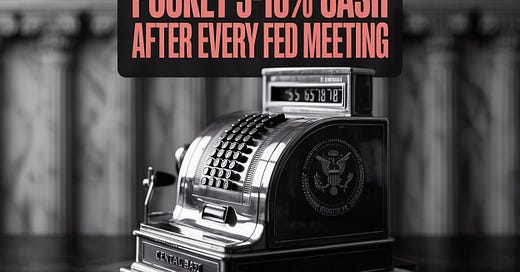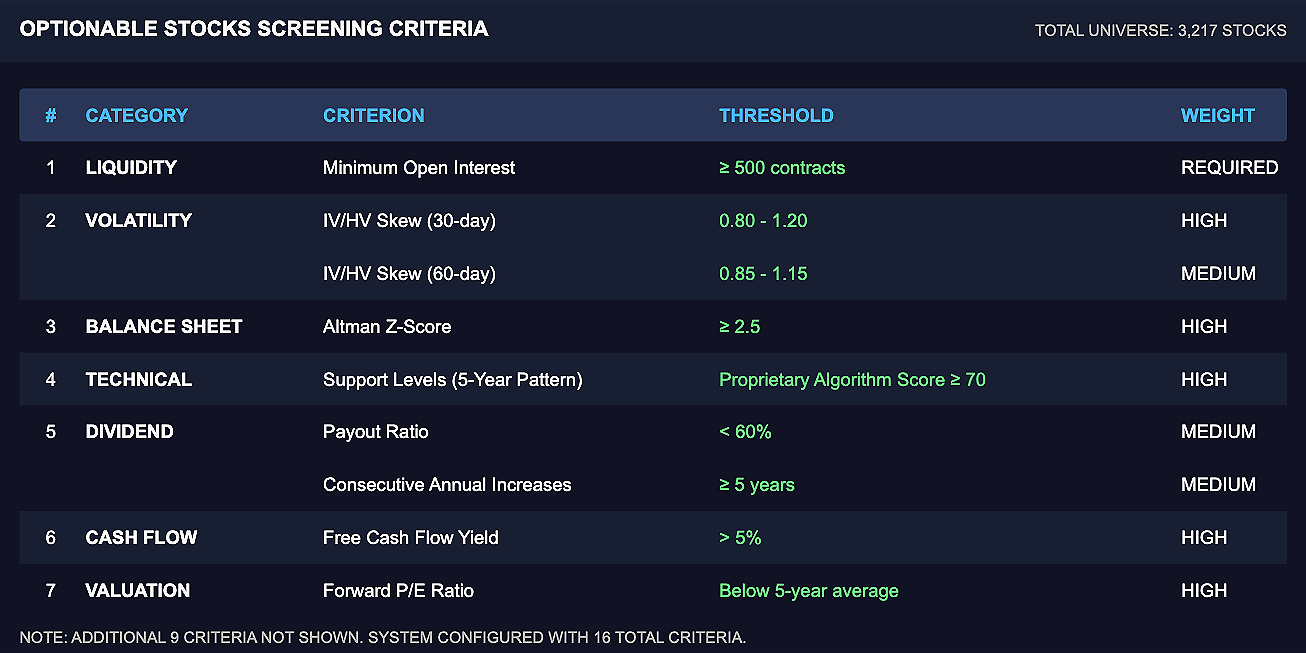How to Pocket 5-18% Cash in 48 Hours After Every Fed Meeting (Next One: May 8–9)
When the Fed speaks, most investors get nervous. I get paid.
Why? Market volatility spikes after Fed meetings, inflating option premiums for exactly two days before collapsing.
Most investors miss this brief window—I don't.
By strategically selling cash-secured puts during this 48-hour opportunity, you're essentially getting paid today (5-18% immediate cash) to promise buying great companies tomorrow at steep discounts (15-30% below current prices).
Let me unpack the exact system:
The Fed Meeting Volatility Pattern: Why It Creates a Cash Window
When the Fed meets, a predictable volatility pattern emerges that practically prints money—if you know exactly when to act.
The Pattern:
Implied volatility (IV) rises 3-5% before each Fed announcement as uncertainty builds
After Powell speaks, IV doesn't immediately collapse—it forms a brief 48-hour "plateau"
Then IV bleeds out an average of 14% over the following week
This creates a perfect cash-collection window on Thu–Fri May 8-9 (10:00-11:30 ET) when:
Premiums remain inflated from the pre-meeting anxiety
Bid-ask spreads tighten since the immediate uncertainty is gone
Most retail traders aren't paying attention (they either sold too early or wait too long)
This pattern repeats after virtually every Fed meeting, creating a reliable income opportunity.
Mini Case-Study — IBM Cash-Secured Put (already completed)
Disclaimer: Everything I've shared is simply for educational and informational purposes and should not be considered financial advice. Everyone's financial situation is unique, and what works for one person might be completely wrong for another. Before making any financial moves, it's always wise to consult a qualified financial advisor who is familiar with your specific circumstances.
Math check
Collateral at risk = $120 × 100 sh = $12 000
Cash collected = $6.30 / share → $630
Holding period = 1 Aug 2024 → 17 Jan 2025 (≈ 170 days)
Effective yield = $630 ÷ $12 000 = 5.25 %
Annualised = 5.25 % ÷ (170⁄365) ≈ 11.3 %
No stock, no drama—just the IV crush doing the heavy lifting.
Just need the right targets.
How Do I Pick My Targets for The Multiplier: The VADER Screen
VADER stands for Volatility Arbitrage Dividend Enhancement Return system.
It's the proprietary screening algorithm that has followed me from the trading desk to my home office.
I'm applying this exact methodology to both my covered call picks and cash-secured puts for years.
The primary difference is that with covered calls, we focus on upside resistance levels; with cash-secured puts, we concentrate on downside support.
I scan 3,217 optionable stocks, filtering for 16 specific criteria, including:
What's left gets sorted into three distinct tiers:
Conservative (5-6% buffer yield)
Balanced (7-10% buffer yield)
Aggressive (10-18% buffer yield)
The final picks are pushed directly from VADER to all Premium subscribers every Thursday and Sunday.
More on VADER and my Investment Philosophy:
Pick Your Lane: The Three-Tier Framework
Total put-selling sleeve: ≤ 15% of your portfolio.
*Never take less—premium floors are your self-respect in numeric form.
Tier 1: Conservative Income (5-6% buffer yield)
Target: Quality stocks at discounted prices with upfront cash
Perfect for: Investors who value safety above all else
Entry Window: Thu–Fri 8-9 May, 10:00-11:30 ET
Minimum Premium: ≥ 95% of the quoted price
Position Size: ≤ 5% of portfolio per trade
The conservative tier, like the 20-year-old Toyota Camry that still starts every morning, may not be sexy, but it's reliable.
Entry timing is everything here.
Wait until Thursday through Friday (May 8-9), specifically between 10:00-11:30 ET. This is when institutional trading desks are most active, creating tighter spreads for retail traders.
Entry cue: Place GTC limit orders at mid-price × 0.95 in the Thursday-Friday window. If you don't get filled, that's the market saying "premium too skinny—wait." Your patience will be rewarded later.
The Pfizer put perfectly illustrates the risk/reward here: You collect $112 per contract upfront. If shares fall 22%, you'd be buying at $18.88 – below COVID crash lows and at a price where the dividend yield approaches 7%.
That's not a risk; that's an opportunity dressed as a risk.
Tier 2: Balanced Approach (7-10% yield with blue-chip quality)
This is where I deploy most of my own cash. It balances meaningful income with quality businesses.
Keep reading with a 7-day free trial
Subscribe to The Multiplier to keep reading this post and get 7 days of free access to the full post archives.










